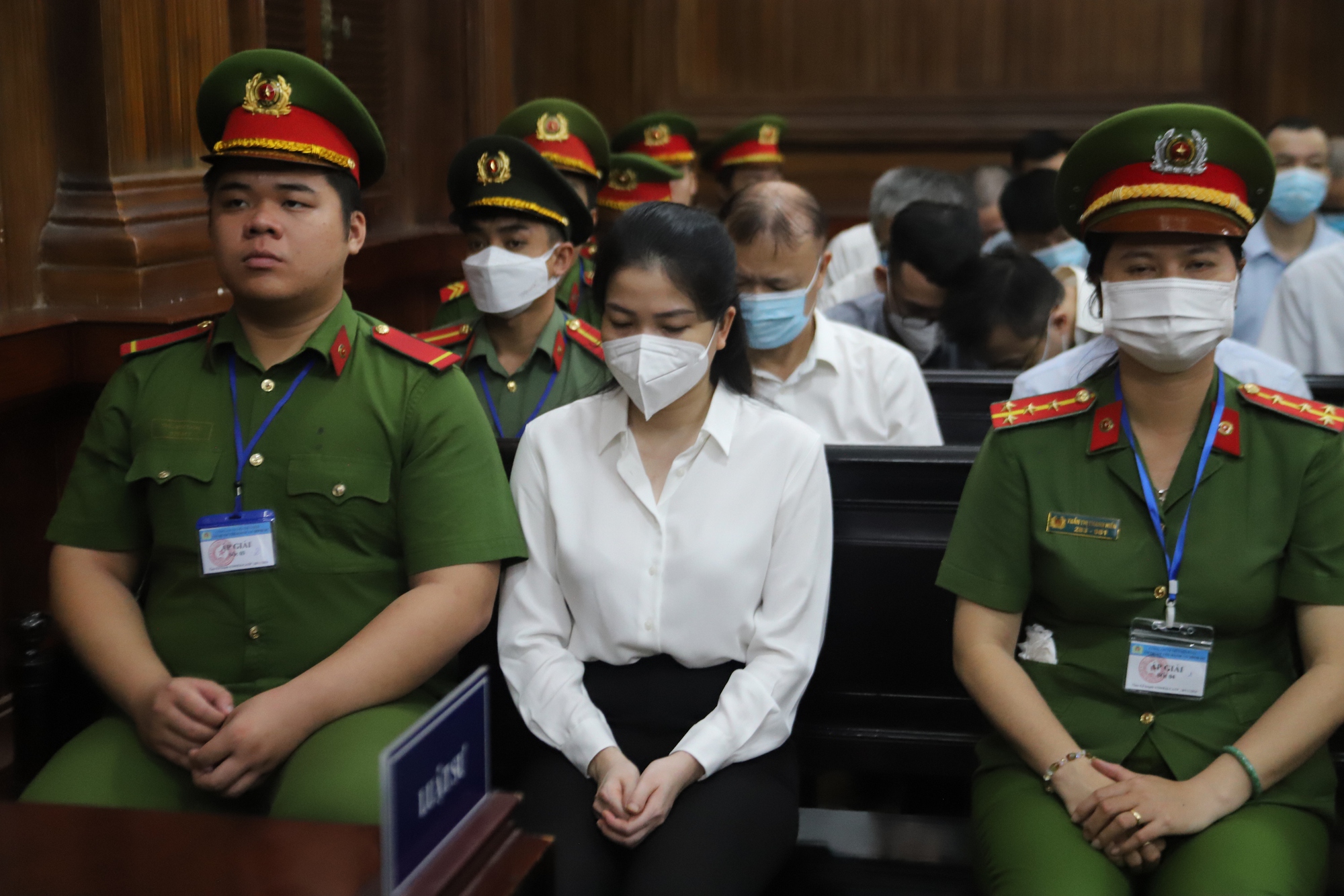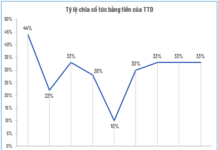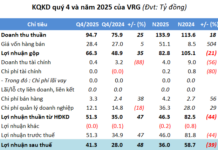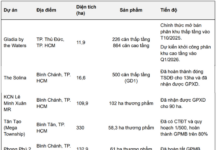On the afternoon of November 26, the People’s Court of Ho Chi Minh City continued the first-instance trial of defendant Mai Thi Hong Hanh, former Director and Chairman of the Members’ Council of Xuyen Viet Oil Company, along with 14 accomplices.
Hoping for a Chance to Redeem Themselves
In court, the prosecutor rejected the defense counsel’s perspective of Nguyen Thi Nhu Phuong (former deputy director of Xuyen Viet Oil, proposed a sentence of 6-7 years in prison for “Violation of regulations on the management and use of state assets, causing loss and waste”). The prosecutor argued that Ms. Phuong played an insignificant role in the case and that there was insufficient evidence to conclude that she was an accomplice of defendant Mai Thi Hong Hanh.
Subsequently, the lawyers continued to participate in the debate.

Defendant Nguyen Thi Nhu Phuong
Continuing to defend defendant Phuong, the lawyer argued that her role should be considered in the context of her being an employee with limited knowledge. The lawyer quoted defendant Phuong’s previous statement that Hanh realized her family was facing difficulties and hired her to work at the company in 2017. After three years of working, Ms. Phuong was appointed deputy director.
Ms. Phuong confessed, “I came from the countryside, and my knowledge and understanding were limited. I was too young and inexperienced. She (Hanh) asked me to be the deputy director, and I obeyed. The other deputy directors in the company did the same. It was only when working with the security investigation agency that I realized that those acts were violations.”
The lawyer also mentioned a notable detail in the trial. Accordingly, the defendant Phuong’s family had just paid 20 million VND to compensate for her actions in this case. The lawyer recounted that 15 million VND was money that Phuong had previously sent home to her father while working in Ho Chi Chi Minh City, intending to buy medicine for him after he had a stroke, but he did not use it. Now, given the circumstances of the case, the father wishes to use this money to help his daughter rectify the consequences of her actions.
Faced with this situation, the lawyer contributed an additional 5 million VND to support defendant Phuong in rectifying the consequences of her actions. The lawyer earnestly requested that the Council consider this with impartiality and hoped that the defendant would receive leniency and a chance to redeem herself.
The Nature of the Bribe
Regarding the defendant Le Duc Tho, former Secretary of the Provincial Party Committee of Ben Tre, the lawyer presented six arguments in his defense. The prosecutor only responded to three of the six arguments.
The prosecutor acknowledged the defense counsel’s arguments for defendant Tho and provided a response to three of the points. Regarding the argument that Mr. Tho did not have individual authority in approving credit limits and did not interfere with the process unlawfully, the prosecutor argued that, as Chairman of the Board of Directors (BOD), Mr. Tho had the authority to convene and conduct BOD meetings to decide on granting or extending credit limits. Mr. Tho had the right to vote in favor or against decisions related to the enterprise.
The prosecutor emphasized that Mr. Tho’s mistake was accepting money from Ms. Hanh and agreeing to extend the time for the credit limit for Xuyen Viet Oil Company. Although he did not have individual authority to approve the credit limit, Mr. Tho voted in favor and signed the decision to grant the credit limit, adjust the time, and set the credit limit for the company. The act of receiving money and voting in favor constituted a criminal offense.
Additionally, regarding the lawyer’s argument that the gifts Ms. Hanh gave to Mr. Tho were only tokens of affection and not criminal acts, the prosecutor refuted that Hanh had admitted to giving money to Tho in two phases. In the first phase, the purpose of giving money was to request the approval of credit limits, extension of credit limits, relaxation of borrowing conditions, and an increase in collateral to 30%; at the same time, it was also meant to congratulate him on his appointment as Chairman of the BOD. However, in reality, Mr. Tho facilitated the approval of credit and extended the time to maintain the credit limit for Xuyen Viet Oil Company.
In the second phase, Mr. Tho influenced the bank to lend 400 billion VND to Viet Oil Company (a subsidiary of Xuyen Viet Oil) on favorable terms, with a collateral of 40% while the parent company was only granted credit with a collateral of 20%. The prosecutor argued that, although defendant Hanh claimed that the money given to Mr. Tho in the first phase was only for Lunar New Year greetings, it was merely an excuse. The actual purpose of giving money was to influence and promote lending.
Regarding the defense counsel’s perspective that the prosecution of Mr. Tho for bribery and abuse of power was unconvincing, the prosecutor affirmed that the prosecution of the two offenses, in two phases, was correct in terms of the person and the crime, and there was no disadvantage to the defendant. For the other defense arguments, the prosecutor did not provide a response.
The Ultimate Guide to the Disappearance of Affordable Housing in Southern Vietnam: Unveiling the Mystery of the $43,000 – $86,000 Apartments
In just a 6-year span (from 2018 to 2024), the Ho Chi Minh City market witnessed the official “extinction” of apartments priced at 1-2 billion VND. Soon, apartments priced at 3 billion VND will also be a thing of the past. In the next few years, the neighboring apartment markets of Binh Duong and Dong Nai are expected to follow a similar trajectory as Ho Chi Minh City’s current situation.
The Capital’s Land Sales Surge: Hanoi Witnesses a 40% Spike in Land Listing in October, Surpassing House and Apartment Sales
According to Batdongsan.com.vn, the Hanoi market witnessed a significant surge in listing postings during October across most property types. The most notable increase was observed in project land listings, skyrocketing by 39% compared to the previous month. Following closely behind, detached houses and apartment listings also experienced substantial growth, with increments of 26% and 25%, respectively, compared to September.
The Soaring Property Prices in Ho Chi Minh City: Are Satellite Towns Feeling the Heat?
As the year drew to a close, an intriguing development emerged in the real estate markets of Dong Nai and Long An, provinces neighboring Ho Chi Minh City. The introduction of luxurious townhouses and mansions, priced from 10 to nearly 20 billion VND per unit, captured the attention of prospective homebuyers and investors alike.
The Southern Surge: As Ho Chi Minh City’s Real Estate Market Bounces Back
As we move into the final quarter of 2024, Ho Chi Minh City’s real estate market has experienced a notable recovery in terms of interest, supply, and selling prices. This positive trajectory has caught the attention of investors and property businesses from the north, who are now eyeing opportunities in the southern market.




















